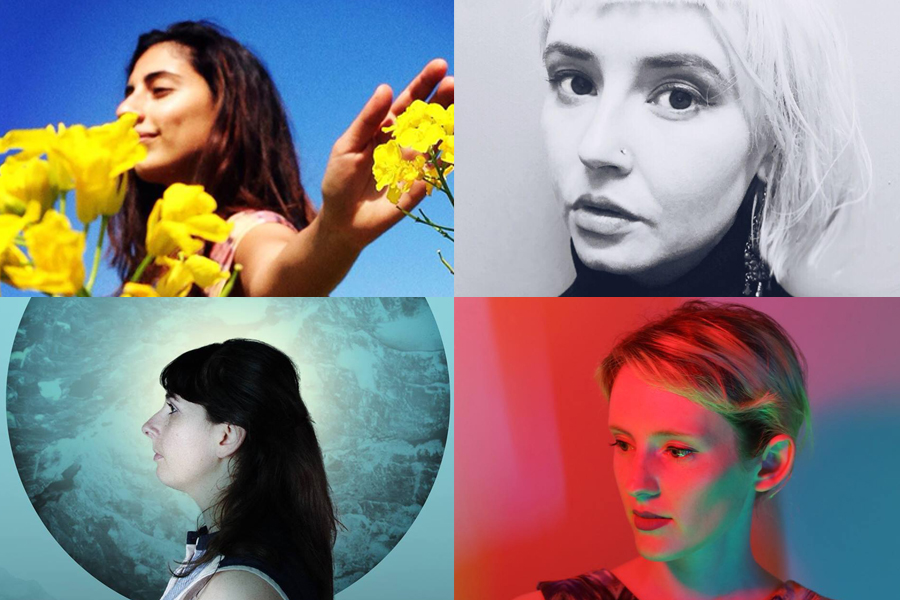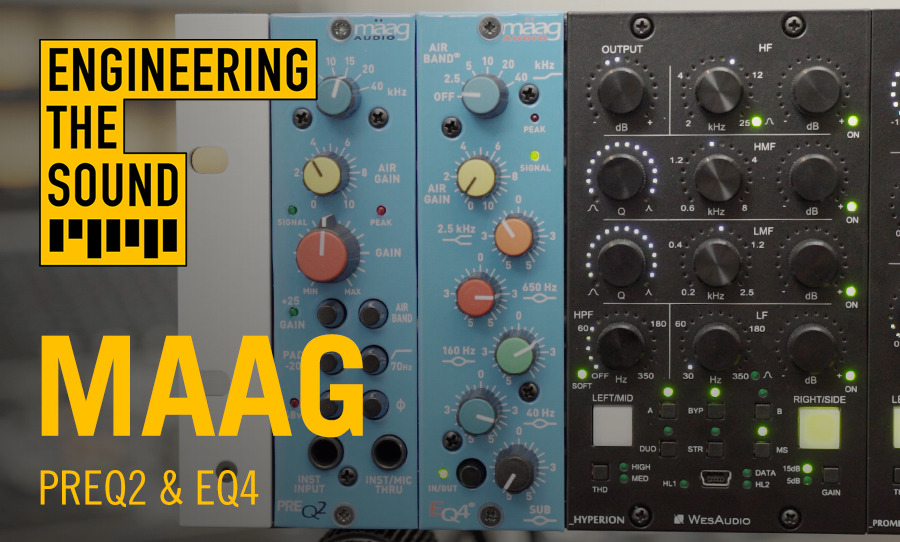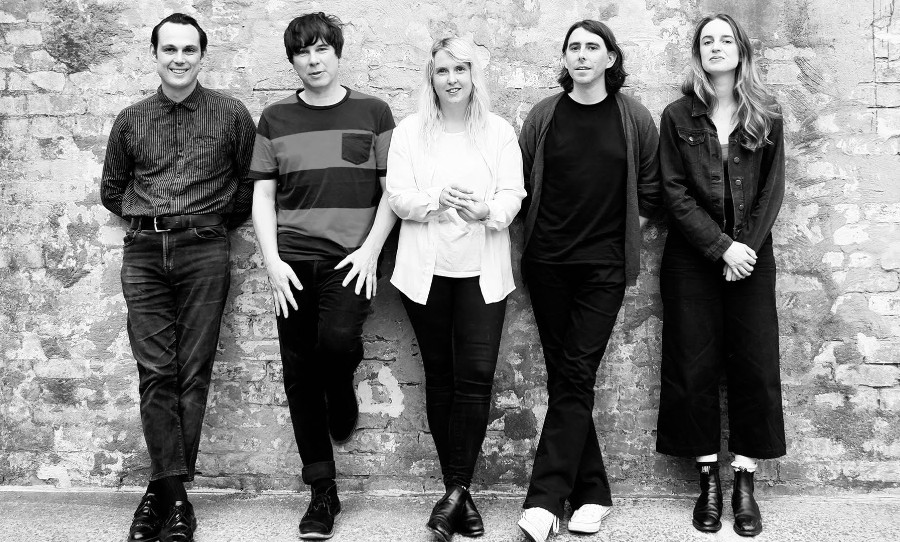After Tuesday’s release of her debut, self-titled EP, we pinned Roni Shewan aka Shiver Canyon as an artist to watch. A cinematic release with a spellbinding, slightly uneasy twist, it was a far greater accomplishment than any budding musician could hope for.
A week from now Shiver Canyon will be launching that release, with support coming from Aphir (Becki Whitton), Liana Pearl & the Pérolas, and Emah Fox. In preparation for this Melbournian pop showcase, we tee’d up a four-way interview between the performers.

Heading to Shiver Canyon’s EP launch? Consider this your encyclopaedia for the night, as each performer picks the brains of the other three.
Becki’s Questions
BECKI: Roni, I’m excited about your new EP! What sorts of stories and concepts inspired the songs you wrote for it?
RONI: Thanks! I’m excited to be finally releasing it! While the songs on the EP were written as separate entities, they all have a common theme of desire and longing and all made the cut for that very reason. When planning the EP, Red (producer) and I wanted to work out a way to bring together all of the styles I’ve been exposed to, being electronic, folk, classical and rock, to make a cohesive work. I think you can definitely hear the trip-hop influence throughout. Some songs are written from a personal experience; Flawed, for example, was written when I’d gone through a particularly hard break up and had lost my job. It explores the idea of having to keep it together and maintain a strong facade, and what happens when that falters. Another song Red Ribbon was written when living overseas in winter, and deals with longing for a loved one during the changing seasons and what symbols we use to remind ourselves of home when we are away for long periods of time. Helen is based on the Euripidean play Trojan Women and is written in the perspective of the women who are about to be shipped off as slaves to their Greek captors. All of their suffering is caused by one man’s love of Helen, who escapes unscathed.
BECKI: Emah, synthesizers seem to make up a big part of your sound, and I know that when you’re not performing you spend a lot of time looking after all the amazing instruments at MESS. What are your all-time favourite synths and why?
EMAH: I find thinking in absolutes and hierarchies really tricky! But I’ll try. Buchla 200 series has such an eccentricity to it that lends itself to open-ended exploration, which I find so valuable, it’s a great machine for me to create on when I don’t have an agenda about what result I’m seeking. It’s also just super fun to interact with on a physical level, I always describe it as a Meccano synth, you really build with it. Recently I’ve been loving the Chroma Enabler and the Oberheim OB-8; they both have an incredible bank of sounds and a ton of tweakable parameters, with some really rich 80s vibes, which fit so well with the songs I’m tracking at the moment. The Chroma also has this slightly clunky keyboard which can really shift the envelope depending on how you play it. One synth I think I will always keep coming back to is the Ondes keyboard/ring synthesizer; its dynamics and pitch sensitivity is so fine, and the timbre can be so intense, almost painful at times, the way it responds to filters and delays can be so lush!
BECKI: Liana, I’ve only seen you play live once before, but I noticed that you have a way of drawing your audience in, not only with your music but with the stories you tell in between your songs. Are there any particular live performers who inspire you or who have influenced the way you’ve designed your own live show?
LIANA: Something my harp teacher said that has always stuck with me: “The harp begins its healing effect before you even play it.” I’ve discovered this to be true each time I play for people; they are in awe of such a beautiful, rare, ancient instrument and it definitely activates something raw inside of them. With our trio Pérolas, most of our songs are very rich musically, with sounds influenced by many cultures, and each original song does have a lot of depth of meaning. The trio is very passionate about sharing messages and stories of environmental preservation, inner peace, and collective consciousness which often touches a deep aspect within those who listen; thus drawing them in. I’d say some of the people influencing our sound and on-stage presence include Dhafer Youssef, Ludovico Einaudi, Nitin Sawhney and Alice Coltrane.
[soundcloud url=”https://api.soundcloud.com/tracks/304082422″ params=”color=000000&auto_play=false&hide_related=false&show_comments=true&show_user=true&show_reposts=false” width=”100%” height=”166″ iframe=”true” /]
Liana’s Questions
LIANA: Emah, what are you currently listening to and how is this influencing your evolving sound?
EMAH: I think I’m actually in such a ‘working on my own shit’ space at the moment that I’m avoiding listening to other people’s work! My sound is probably evolving more under the influence of the various synthesizers I’ve been playing with lately. I have all these polyrhythmic melody ideas and testing them out on different machines is really exciting, it’s like discovering, ‘ohhhh yep, that’s what this song is, I get it now!’ The influences I can hear in my music right now are kind of a combination of early eighties synth pop like the Eurythmics, and slightly weirder examples like early Peter Gabriel, Kate Bush, and definitely some 90s hip hop production influences. There’s also a kind of epic melodrama to a lot of my work which might be influenced by PJ Harvey, Bjork, Florence and the Machine. I also love LCD Soundsystem and was listening to them a lot a few years back – I can hear the Eurythmics influence in their sound, too. But yeah, mostly these days I am listening to audio books and meditation CDs! Ha.
LIANA: Roni, what do you share that’s different from the current Melbourne music scene?
RONI: What a good question! I guess what I’d like to think is different or unique about my music is the perspective of the stories and emotions that are conveyed. They are all based on my own personal experiences, influences and perceptions of the world around me. Musically, I’ve always tried to stay true to my intuition when writing and try to avoid mimicking other artists, though there are artists that have definitely informed my writing over the years. I think the way the EP explores the blending of traditional styles such as folk, world music and art song with more contemporary electronic elements definitely offers something different. In a performance setting I have begun to incorporate live visuals which are collected and edited with the purpose of conveying the mood and story of each song, which helps create a different and individual experience for audiences. But I guess the most individual aspect of the music I perform is my voice, which, while drawing from many influences, is distinctively me. This is what I love about singing – every voice is individual, with differing tones, inflections and personality.
LIANA: Becki, is there one particular message you convey to your listeners through your music?
BECKI: All my songs tell different stories but something I’ve been thinking about a lot recently is the fluidity of identity and the conflict between that and the pressure that exists in society to pin yourself down as one specific, continuous thing. The album I’m releasing soon is called Twin Earth because I was thinking about all the different lives I could be leading in parallel universes if a new me cropped up every time I made a crossroads decision or someone formed a different opinion of me. It seems funny to me that it’s so common to want to have consistent ideas about people when ideally we’re all learning new stuff all the time and broadening our perspectives.
Roni’s Questions
RONI: Emah, I really love your new single Give it Away. Can you tell me more about the tune, what inspired it and the making of the film clip?
EMAH: Thank you! I wrote Give It Away at the end of a pretty messed up relationship, as a way of processing it, I guess. The lyrics are pretty much literally just snippets of some of the things he said to me about what he wanted from me. It’s about possessiveness, control and abuse dressed up as protection, care and intimacy. The film clip is less literal, it’s more of a visual and performative exploration of those demands and roles that women are often expected to inhabit in their relationships with men. I filmed it against my bathroom wall with a K-mart lamp positioned behind my video camera, and just kind of improvised with those things in mind. I tried to capture a lot of different emotions and reactions to that kind of control in my performance, and to not filter any of the vulnerability in expressing them. Then I edited it together trying to highlight that awkwardness and intensity rather than shying away from it. It was an intimidating process, and involved a lot of googling every time I wanted to try another editing technique! I learned heaps.
RONI: Becki, you produced your upcoming album Twin Earth and have also been producer to a number of up and coming artists. What informs your production choices and which producers have inspired you?
BECKI: The influences on my mixing and production work vary a lot depending on who I’m working with. Some artists have a clear idea of what their musical world looks and sounds like long before they work with me, in which case production becomes a journey into that musical landscape. I’ll listen to the mixes they love on other artists’ tracks and the soundscapes they prefer and then help them build a sense of space in their songs based on that vision. Then there are artists who’ve chosen to work with me because they want something they’ve made to step into a similar sort of sonic world to what I’ve tended to create for my own music. The soundscapes I make for my own music are inspired by a lot of visual material; mostly glitch art and science-fiction influenced stuff.
RONI: Liana, your trio Liana Pearl and the Pérolas really impressed me with your ability to play together as an ensemble. How did you all meet and what is the process of writing and arranging with the band?
LIANA: I’d worked with Fabian Aravalés (guitarist/ producer) in late 2015 to produce my first solo EP, and prior to that we’d met synchronistically at various gigs and music jams in Brunswick. I also met Jag Singh (tabla / trumpet) at a local jam, and upon the three of us meeting for the first time, there was instant musical and personal chemistry. It’s really exciting getting together, sharing ideas, experimenting and creating magic! Our process is organic, and rehearsals are like a ‘musical lab’, where we experiment with various instruments and electronic soundscapes until we figure out the perfect formula. It usually takes us a few times playing live to really sink into the music and feel into an arrangement that works and is best received by our audience. We love to incorporate a lot of improvisation, as we all have a solid background in jazz and meditation-style music, which involves creating in that very moment, based on feeling and expression.
[soundcloud url=”https://api.soundcloud.com/tracks/309276090″ params=”color=000000&auto_play=false&hide_related=false&show_comments=true&show_user=true&show_reposts=false” width=”100%” height=”166″ iframe=”true” /]
Emah’s Questions
EMAH: Becki, I find your music to be such a beautiful, flowing dance between what’s conventionally labeled as ‘masculine’ and ‘feminine’. Is that something you ever think about consciously while creating tracks or exploring sonic ideas?
BECKI: This is a great question, it’s really interesting to me that you’ve experienced my music in that way. Including steeply contrasting elements in my music has become more and more important to me over the course of my career so far, for a long time I would just make tracks entirely out of layers of my voice, so my songs didn’t have the same sort of internal tension. I don’t think I’ve ever consciously thought about that process in the language of gender though, it’s more in my lyrics and song titles that I consciously play around with those sorts of ideas.
EMAH: Roni, I’ve always really admired your stage presence, the way that you seem to be physically and emotionally so at ease and in your element when you perform. Is that something that came naturally to you, or have you developed it over time?
RONI: I definitely think it’s something that has developed over time through lots of performances in many varying contexts. Though I love performing and have always wanted to do it, I definitely suffered from stage fright early on. The more I threw myself into performing, however, the easier it became and the more I was able to handle the nerves and anxiety that often rear their ugly head before a show. I always try to bring myself back to the music and the emotions I’m trying to convey. When you do that, I think it becomes really easy to feel more at ease with what you are doing.
EMAH: Liana, you work as a musician and as a creative therapist; how do the different creative modes of performing and writing influence or affect your own personal experience of healing and health?
LIANA: Yes! I’ve just started my Masters of Music Therapy and am loving combining my skills and love for both fields. I began working in mental health as an occupational therapist in 2013, where I discovered a lot of the people I worked with enjoyed music and shared a positive relationship with the creative modality. I began to incorporate music activities in sessions and group work and began researching the amazing effects music has on the brain and what it does for people on a spiritual level. This definitely changed the way I viewed and used music in my own personal journey. I feel I am more aware of how I use music to aid in my own well-being. I use my voice daily to ‘tune’ my body, which often reduces pain and gives me a clearer mind. I use music and songwriting for catharsis and self-expression, but to also ground me into the present moment, where I am often taken into an altered state of consciousness.
Shiver Canyon are officially launching their debut, self-titled EP on March 23 at The Grace Darling Hotel in Collingwood, Victoria. Grab all the details, and your tickets, here.



